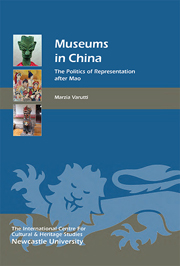Book contents
- Frontmatter
- Contents
- List of Illustrations
- Acknowledgments
- Chronology
- List of Abbreviations
- Introduction
- 1 Cultural Heritage in China
- 2 Museums in China: origins and Development
- 3 New Actors in the Chinese Museum World
- 4 Museum objects and the Chinese nation
- 5 The nation in the Museum
- 6 The Politics of the Past
- 7 The Representation of the Past in China's Museums
- 8 The Politics of identity
- 9 The Museum Representation of ethnic Minorities
- 10 Techniques and sites of Display of ethnic Minorities
- Conclusions: The new Museums of China
- Appendix: List of Museums in China Visited by the Author
- Bibliography and References
- Index
- Heritage Matters
5 - The nation in the Museum
Published online by Cambridge University Press: 05 March 2014
- Frontmatter
- Contents
- List of Illustrations
- Acknowledgments
- Chronology
- List of Abbreviations
- Introduction
- 1 Cultural Heritage in China
- 2 Museums in China: origins and Development
- 3 New Actors in the Chinese Museum World
- 4 Museum objects and the Chinese nation
- 5 The nation in the Museum
- 6 The Politics of the Past
- 7 The Representation of the Past in China's Museums
- 8 The Politics of identity
- 9 The Museum Representation of ethnic Minorities
- 10 Techniques and sites of Display of ethnic Minorities
- Conclusions: The new Museums of China
- Appendix: List of Museums in China Visited by the Author
- Bibliography and References
- Index
- Heritage Matters
Summary
Each country uses its museums to represent and reconstitute itself anew in each generation. (Kaplan 1994, 4)
Museums are privileged loci for the representation of the nation: ‘museums are major apparatuses in the creation of national identities. They illustrate the nation as cultured, as elevated in taste, as inclusive and as paternal’ (Hooper-Greenhill 2000, 25). Museums are the warrants for national identity as they are ‘the site of a symbolic transaction between the visitor and the state. In exchange for the state's spiritual wealth, the individual intensifies his attachment to the state’ (Duncan and Wallach 2004, 59). To this, one should add the temporal dimension: the museum ‘confers unity to the past, a unity of place and time’ (Ditchev 2001, 330).
The representation of national identity implies the selection and (re)interpretation of its components (ethnic, historical, territorial, linguistic, cultural, artistic and symbolic, among others). As Prasenjit Duara (1993, 19–20) remarks:
the manner in which a nation is created […] is the imposition of a historical narrative or a myth of descent/dissent […] When a mytho-historical narrative is imposed upon cultural materials, the relevant community is formed not primarily by the creation of new cultural forms […] but by transforming the perception of the boundaries of the community.
Museum representations (and particularly those in national museums) supply ‘miniatures’ of culture (Lévi-Strauss 1966, 22—30): history, language, literature, art, cultural production, technological achievements — all the major defining features of a culture find representation in the museum.
- Type
- Chapter
- Information
- Museums in ChinaThe Politics of Representation after Mao, pp. 77 - 88Publisher: Boydell & BrewerPrint publication year: 2014



